
Q When the phone is ringing, there's a client to be checked out, and a technician has a question, how do I prioritize?

Q When the phone is ringing, there's a client to be checked out, and a technician has a question, how do I prioritize?

Q Should I receive compensation or bonuses for the dental procedures I'm specially trained to perform?

Most of us aren't very comfortable talking about ourselves. It's a hard skill to master, and too often it feels like you're bragging. But if you're not talking about what you do well, how will others know? If you're waiting for them to catch you in the act, you may have a long wait.

Q What can we do to gently handle pets with possible pain issues?

Sick of the communication gaps and the infighting about policy changes that often occur between front and back office team members? Crystal Steen, a receptionist at Pet Care Vet in Virginia Beach, Va., suggests electing area liaisons.
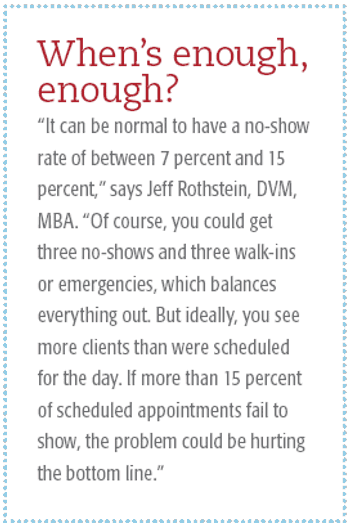
You'd much rather be working with clients and pets than thumb-twiddling or standing around dreaming about services you could be rendering. So use these tips to cut back on no-shows and get back to business.

On an ordinary day a few months ago, I watched a cartoon with my toddler about seeds of discontent.

You can safeguard the lives of pets and their families by discussing zoonotic diseases and prevention.

Our receptionists often forget to give clients their pets' medications before they leave our practice. I created a hanging prescription filing system to simplify the process, but that hasn't resolved the problem. I've approached my managers about the issue, but they don't seem concerned. What should I do?

The team at Concord Veterinary Center in Springville, NY, expected an uneventful monthly practice staff meeting, but Debbie Kaczmarski, LVT, the hospital manager, and Craig Wiede, DVM, the practice's owner, had another plan.

I recently discovered I'm pregnant. How do I protect myself and my baby from work-related hazards?

I work at a walk-in clinic. Some clients ask for me, but if it's a 40-minute wait, they'll see another doctor. My boss wants to pay me a percentage of my production. Is this fair at a walk-in clinic?

Introducing new drugs or procedures into your practice can be frustrating if you're an associate-and it can be especially tough if you're a recent graduate. Here are a few tips I've learned through experience.

The practice owner at the hospital where I'm an associate won't invest in a new piece of equipment that I think we really need. How can I convince her to buy?

Feeling sapped? Rundown, tired, out of sorts? Oh yeah. It's so easy to give and so hard to say no. You do it all the time. It's the 15 minutes at the end of the day you spend making a comfy bed for a sick pet or the extra walk you sneak in for your favorite boarder. Or maybe you volunteer to stay late to finish filing or clear the clutter from the reception area. The truth is, you do a lot.

I work at a large practice, and our team members get along well and even socialize outside of work. There's one hitch: One team member practices poor personal hygiene. Periodically, she emits a strong body odor for days at a time. Her team leader approached her when the problem first surfaced, and she improved temporarily. How can we approach her again without embarrassing her--and ourselves?

You're the head technician at a flourishing practice. The hands-on owner is struggling to keep up with his rapidly expanding client base, and he often fails to delegate tasks to his team. Firstline Editorial Advisory Board member Sheila Grosdidier, BS, RVT, a partner with VMC Inc. in Evergreen, Colo., offers this script for addressing the owner, Dr. Committed
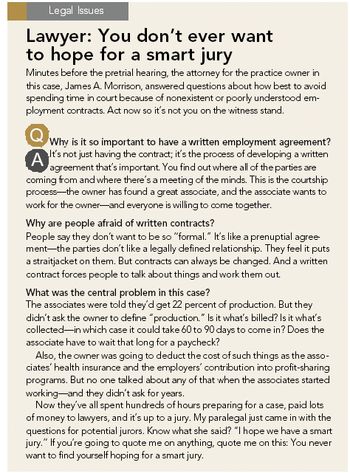
I'm an expert witness for a practice owner who is being sued by two former associate doctors. What caused this litigation? Poor communication and a contract written on a napkin.

It's easy to get fired--lying or stealing will l get you there fast. But if you want to take the slow, painful route, use these examples to really ruin your reputation before you get the heave-ho.

Q What's the best way to keep track of expiration dates on drugs?

For the first few months after I gave birth to my son, I was pretty sure I wanted to quit my job. I loved my work, but those 12 weeks I'd spent at home getting to know this interesting little person weren't enough. Every morning, when I sent him off to day care, the guilt crept in. By mid-morning, it was an ache. And by 3:30 p.m., I could only think about rushing home for a few minutes with my son before bedtime.
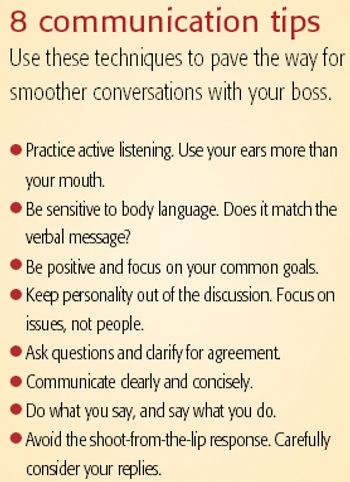
Before you punt the ball on your relationship with your boss, consider whether you can gain ground with a little coaching. Then tackle any sore spots with these six strategies.
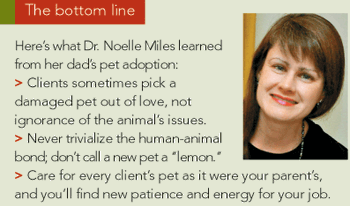
Probably not, but I learned better client care when my dad ignored my advice and picked a pet with his heart-not his head.

Tired of the usual performance rewards, Margaret Fasnacht, business manager at Animal Critical Care and Specialty Group in Malvern, Pa., decided to try a different approach. She presented reception team members with a unique gift certificate-good for one extra paid vacation day and Fasnacht's personal commitment to cover the shift on the team member's day off.

You can probably look down the street and see someone you know doing a job similar to the one you do every day. The only difference: The patients at your practice are pets, and theirs are people.
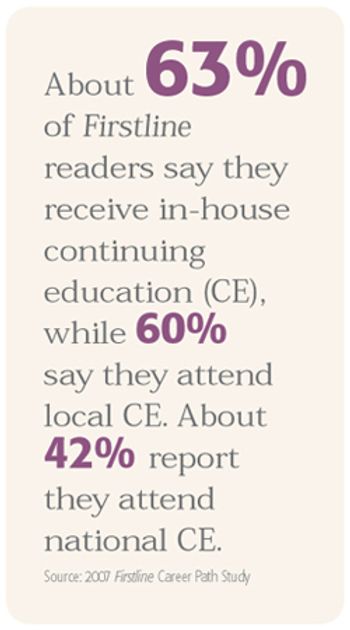
Seventy percent of Firstline readers say they need in-house training to take the next step in their career, according to the 2007 Firstline Career Path Study. And about 68 percent say they also require formal training to grow in their jobs.
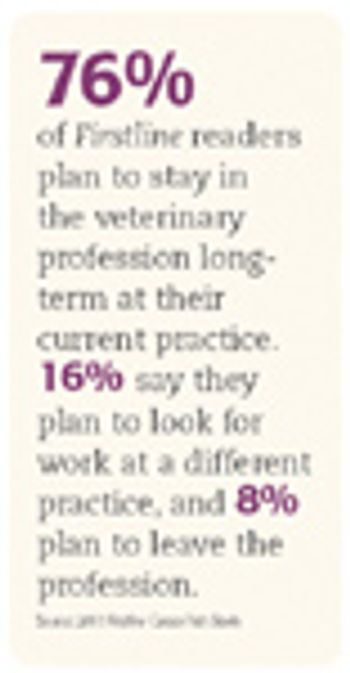
What's the difference between a job and a career, and which would you use to describe the work you do? While some team members deliberately take the veterinary path, others just stumble across it by accident. Regardless of how or why, let's see what the label you've chosen means.

Check out the answers to your questions about your salary and benefits, how to handle team conflict, what clients want, who owns pets, and data on 11 other critical trends.
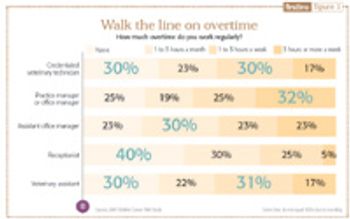
Yes, but it takes practice. Firstline readers who are 46 to 55 years old are most likely to work more than three hours of overtime, while those who are 56 or older report they're most likely to work no overtime.
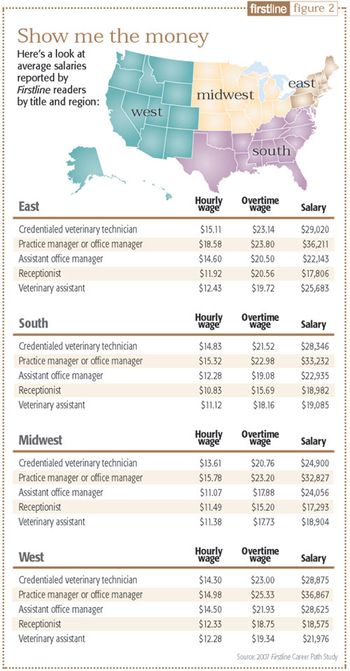
Pick the right region, check your salary. Too bad it's not that easy. While the regional wage data by title may reveal trends in your pay, it won't tell you what you should be making. Why not?